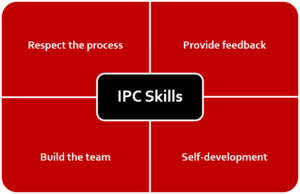
Inter-Personal Communications Skills
Inter-Personal Communications Skills
 There are four key areas of inter-personal communication skills emphasized throughout this program.
There are four key areas of inter-personal communication skills emphasized throughout this program.
Respect the process
Communication is a complex, constantly occurring phenomenon. It happens in every word we say, every hand gesture, every turn of our body. It happens when our eyes roll, the corners of our mouths turn, and even when our pupils dilate. Traditional communications models (even the one taught in this program) tell us that senders and receivers correspond by sending messages thru various channels. It’s important to make very clear that this is not a binary occurrence and that communication is a collaborative and holistic process that occurs on multiple two-way channels. Instead of a walkie-talkie style channel where only one person can speak at a time – imagine the channel more as a telephone where the line is open in both directions. Also imagine that both the dog and the handler have as many as five (all five senses) channels open at the same time.
- Communications is a continuous process
- Be constantly present and send messages that are as clear and consistent
- Ask clarifying questions and avoid judgment
- Break down communications barriers
Provide feedback
Conversations work best when two or more people are engaged in dialogue. Of course, each could provide a continuous monologue of their own interest in the topic, talking over each other, never responding to one-another. But they work best when we provide each other with authentic and sincere feedback.
- Feedback is specific and addresses a changeable behavior
- Feedback causes someone to think about underlying values and beliefs
- Feedback takes into account the needs of the receiver
- Feedback is given at an appropriate time
- Feedback can be used immediately, considered later or dismissed
Build the team
Whether the conversation is over the dinner table with the family, over coffee with an old friend, or in training room with a small group of co-workers, a conversation is a conversation. Equally important a relationship is a relationship and a team is a team. Some behaviors that can lead to a better conversation and improvement of relationships in the group include:
- Committing
- Supporting
- Not seeking recognition
- Not promoting special interests
Effective communicators commit themselves to the conversation. They are clear and obvious about their perspectives and interests in a conversation. They will avoid being passive aggressive, they will use appropriate body and paralanguage to correspond with and corroborate their words. Effective communicators are supportive of each other. In order to fully develop a conversation and to create a rich emotional/cognitive learning environment they will ensure the other parties to the conversation feel supported and safe to be a part of it. Teams work best when all members are treated equally and individual members do not promote special-interests or seek undue recognition. Leaders and talented members of a team will ultimately rise to the top, especially when they commit themselves to supporting the other members.
Self-development
Self-development is explored thoroughly throughout our Inter-Cultural Skills and Leadership Workshops. As we delve into some provocative, possibly even contentious topics we will not only have plenty of opportunity to develop ourselves as leaders and effective communicators, but also as human beings. Conversation gives us an opportunity to explore our own life experience and the experiences of others to compare and contrast. The overarching theme to effective inter-personal communication is empathy. In this course we need everyone to assume some risk on this and be willing to participate with genuine real-world stories. Every student that attends this course will experience it differently and apply it differently when they return to their organizations and groups. A key component to any conversation is understanding how everyone is a member of multiple groups simultaneously. A conversation in this course with another student is based on each parties’ collective experience and will be applied to different groups when each returns to work and home. We also have to be aware of bias and stereotypes during conversations and avoid using disparaging, pejorative terms.
